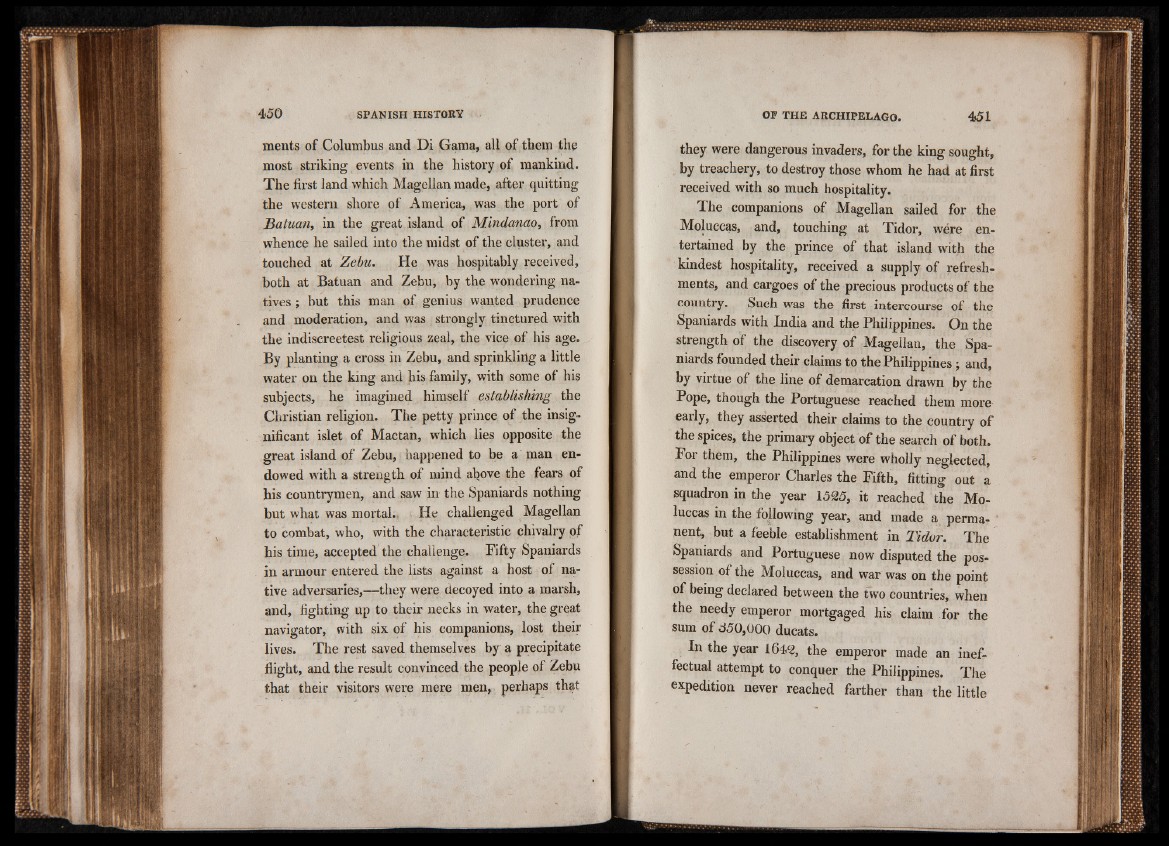
ments of Columbus and Di Gama, all of them the
most striking events in the history of mankind.
The first land which Magellan made, after quitting
the western shore of America, was the port of
Batuan, in the great island of Mindanao, from
whence he sailed into the midst of the cluster, and
touched at Zebu. He was hospitably received,
both at Batuan and Zebu, by the wondering natives
; but this man of genius wanted prudence
and moderation, and was j strongly tinctured with
the indiscreetest religious zeal, the vice of his age.
By planting a cross in Zebu, and sprinkliiiga little
water on the king and his family, with some of his
subjects, he imagined himself establishing the
Christian religion. The petty prince of the insignificant
islet of Mactan, which lies opposite the
great island of Zebu, happened to be a man endowed
with a strength of mind above the fears of
his countrymen, and saw in the Spaniards nothing
but what was mortal.. He challenged Magellan
to combat, who, with the characteristic chivalry of
his time, accepted the challenge. Fifty Spaniards
in armour entered the lists against a host of native
adversaries,—they were decoyed into a marsh,
and, fighting up to their necks in water, the great
navigator, with six of his companions, lost their
lives. The rest saved themselves by a precipitate
flight, and the result convinced the people of Zebu
that their visitors were mere men, perhaps that
they were dangerous invaders, for the king sought,
by treachery, to destroy those whom he had at first
received with so much hospitality.
The companions of Magellan sailed for the
Moluccas, and, touching at Tidor, wëre entertained
by the prince of that island with the
kindest hospitality, received a supply of refreshments,
and cargoes of the precious products of the
country. Such was the first intercourse of the
Spaniards with India and the Philippines. On the
strength of the discovery of Magellan, the Spaniards
founded their claims to the Philippines ; and,
by virtue of the line of demarcation drawn by the
Pope, though the Portuguese reached them more
early, they asserted their claims to the country of
the spices, the primary object of the search of both.
For them, the Philippines were wholly neglected,
and the emperor Charles the Fifth, fitting out a
squadron in the year 1525, it reached the Moluccas
m the following year, and made a permanent,
but a feeble establishment in Tidor. The
Spaniards and Portuguese now disputed the possession
of the Moluccas* and war was on the point
of being declared between the two countries, when
the needy emperor mortgaged his claim for the
sum of 550,000 ducats.
In the year 1642, the emperor made an ineffectual
attempt to conquer the Philippines. The
expedition never reached farther than the little